2021 MDP Practicums
Nora spent her summer working on two different qualitative studies analyzing sexual and reproductive health and rights outcomes domestically and internationally. Nora worked as part of an EGHI team to evaluate communications around the recent revocation of the Global Gag Rule for NGOs in Malawi, Mozambique, and Zimbabwe. Along with other Emory students, faculty mentors, and partners from the International Planned Parenthood Federation/Western Hemisphere Region (IPPFWHR), the team conducted over 40 Zoom interviews in order to better understand the communication landscape on the ground in these countries. Nora also worked as a graduate research assistant for the Provider Readiness for Virtual Implementation and Delivery of Medication Abortion Services (PROVIDA) study. This study investigates the feasibility of providing medication abortion services in the Southeast via telehealth. Nora managed recruitment for this study and is currently assisting in interviewing study participants. |
As an Emory Global Health Institute team member, Melissa worked remotely on a qualitative research project in San José, Costa Rica in partnership with the Universidad de Ciencias Médicas (UCIMED). The project’s objective is to assess the perspectives and experiences of unintended pregnancy among individuals in Costa Rica and the relation to reproductive health rights, laws, and policies given the shifting landscape of sexual and reproductive rights in Latin America. The project is ongoing and initial data findings will be used to provide resources to UCIMED and the Costa Rican Ministry of Health on current perceptions of sexual and reproductive rights, policy, and practice. |
This summer at The Conservation Fund, Abbie Cohen functioned as a research intern for the organization’s Working Farms Fund (WFF). The WFF addresses a lack of young, farmers of color in the state of Georgia by facilitating land access. Abbie investigated the Biden Administration’s recent policies relating to food and agriculture: The American Rescue Plan and the Build Back Better Initiative. She focused specifically on how the provisions of the new policies may impact the Working Farms Fund. Aside from compiling this Policy Report, Cohen also researched the impact of COVID-19 in a Pandemic Impact Report. Her findings will help to better understand the effects of the pandemic on farmers and food supply. A recent New York Times article features the WFF. |
I served my practicum at Georgia Conservancy. There, I worked on the Georgia Now and Forever (GNF) project, which explores how Georgia’s land cover has changed over almost 5 decades (1974-2016). Working in a small team, I crafted a story map to illustrate these historic environmental changes with particular focus on developed, forested, and agricultural lands. This process included data analysis, data visualization, and narrative creation. This story map, which will be publicly available soon, will be a useful educational policy tool to promote sustainable development and targeted conservation across this rapidly changing state. |
Justin worked with the Community Farmers Markets (CFM) and their partner Fresh Marta Markets (FMM). CFM works to further develop local food infrastructure for long term sustainability and meaningful community impact, by supporting several markets and food system focused initiatives throughout Atlanta. The Fresh Marta Markets are an initiative that CFM is facilitating in collaboration with Atlanta's Metropolitan Atlanta Rapid Transit Authority (MARTA). Justin worked closely with the CFM/FMM team and MARTA representatives to apply for two USDA grants, as well as completing other tasks and attending FMM stands throughout the week. The two grants, titled the Farmers Market Promotion Program (FMPP) and Local Food Promotion Program (LFPP) were applied to fund programs conducted through CFM and FMM respectively. Justin assisted in writing the narratives for each grant, as well as contacting CFM/FMM partner organizations and attending MARTA meetings. He also assisted in redesigning data collection tools used to evaluate Marta Markets' effectiveness and community impact. Both grants were later approved by USDA and the Fresh Marta Markets are set to expand in 2022. |
Sam Grimes summer practicum was hosted by Truly Living Well Center for Natural Urban Agriculture (TLW), a nonprofit organization established in 2006 that is primarily agriculture driven. He was tasked with monitoring and documenting pest activity on the farm as well as research to advise on natural pest management and plant health. He used an app to identify bacteria and diseases that were affecting some plants and fruits grown on the farm. This became the basis for the research and development of a pest management process as well as a presentation paper on pest control. He also worked with the new farm manager, Amico, to redesign the farming system for planting and harvesting and developed tools currently used to document and track activities and achievements. Sam also coordinated and supervised volunteers and worked at the greenhouse, in aquaponics, and on marketing the farm. |
Laura spent her practicum working virtually with CARE Turkey on their Syrian refugee resettlement program, analyzing 3 years’ worth of quantitative data in order to make programmatic recommendations. She consolidated 13 datasets into 2 master databases—one focusing on their WASH and Shelter program, and the other focusing on their case management program. Using descriptive and bivariate statistics, she found trends within the 150,000+ entries of data, and used these trends to suggest methods of improvement moving forward for the program. During the summer, she also worked part time as an administrative assistant for Refuge Coffee Co., a coffee shop in Clarkston, GA that hires refugees and immigrants. |
|
Over the summer Shafila interned with the Toco Hills Community Alliance Food Pantry. Shafila had many duties including: Qualitative research for healthy food access, preparing food boxes, food distribution, improving efficiency, waste reduction development, logistical inventory management, organizing food bank stocks, Covid regulation compliance, ensuring diet restricted meal availability, quality control of food distribution, and customer service. Shafila plans to use these skills to help reduce food insecurity and malnutrition for at-risk and marginalized communities. This experience gave her the desire to foster healthier, more sustainable communities by bridging gaps between groups of people who might normally never interact with one another. She saw the power in partnerships dedicated to the common goal of community wellbeing and plans to emulate that in her future endeavors. |
For Samridhi’s summer practicum, she had the opportunity to work with the Terwilliger Center for Innovation in Shelter (TCIS) at the Habitat for Humanity International headquarters here in Atlanta on the early-stage formation of the Way Forward Coalition (WFC). The coalition was inspired by the 2020 Cornerstone of Recovery report’s main finding that the housing sector’s contribution to GDP in emerging market countries is larger than expected (14-16% on average), and roughly on par with other key sectors like manufacturing. Further, the housing sector has strong economic multiplier effects and social benefits, making it an ideal avenue for COVID-19 recovery policies. Samridhi’s roles related to the knowledge management, thought leadership, and research aspects of the coalition. Her favorite part about this experience was getting a chance to participate in creating the Theory of Change (TOR) model for the Way Forward Coalition alongside the M&E team. She also enjoyed seeing the various leading housing experts and actors around the globe work together on affordable housing solutions. |
Natalia spent her summer working as part of the Latin American Program in the United States Institute of Peace, focusing on the importance of international efforts to complement and support peace processes in Latin American countries. Natalia worked towards consolidating the idea of Paz Territorial, a peace that is built upon the beliefs, culture, and own understanding of peace rather than the theoretical conceptualization of how peace looks like under a westernized lens. International efforts should seek to incorporate peace by its interconnected ethnic, territorial, sexual, gendered, cultural, and participatory dimensions distancing from the theoretical approach that seeks peace as the absence of conflict or war. |
For his summer practicum, Jonathan Santos worked with The Guild and the Partnership for Southern Equity (PSE). With The Guild, Jonathan worked in southwest Atlanta, creating a community assessment guide to support the GroundCover initiative. Working to combat gentrification in the area, the initiative utilizes a community stewardship framework, where community members buy shares ($10 - 100) in real estate property. The property is then converted to an affordable residential and commercial tenant space paying yearly dividends to community investors. With PSE, he filled in gaps and provided expertise on the several public health initiatives including the 2 Georgia’s initiative and the Climate Change, Health, and Equity initiative. |
MADELINE STEINER Madeline Steiner worked with the International Rescue Committee (IRC) as a New Roots Program Intern, and also as a field scholar on a Emory Global Health Institute (EGHI) project conducting qualitative research for a “landscape analysis of social and behavior change approaches in nutrition-sensitive agriculture.” Her main work with the IRC included co-leading the Youth Food Justice Internship program for students at Clarkston High School, designing curriculum and carrying out lessons on food justice, food security, and agriculture. She also assisted with the maintenance and planning of elementary school garden programming. In August, she completed a short-term deployment to Virginia with the IRC to assist in Afghan SIV processing and resettlement efforts. On her EGHI team, she took the lead in analyzing a nutrition-sensitive agriculture program in Rwanda. She conducted a document review with data abstraction, led virtual interviews, and participated in an in-person site visit in October. |
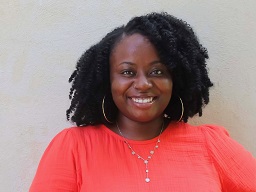 DARNESHA TABOR During the summer of 2021, Darnesha worked with two organizations for her practicum experience. At Global Growers Network (GGN), she worked on the monitoring and evaluation of their USDA Food Safety Project programs, which aim to mitigate barriers to land and market access for farmers of color. Through culturally inclusive approaches and innovative programming, the project is creating new opportunities to increase financial viability for farmers. She also worked as a student research assistant with Dr. Webb Girard, at the Rollins School of Public Health on a program evaluation of a special emergency grants program with the Global Alliance for Improved Nutrition (GAIN). The project was implemented to support the food and nutrition security of 20,000 essential workers in low- and middle-income countries during the beginning of the COVID-19 pandemic. In this role she assisted in developing qualitative data collection tools and in data collection and analysis. The summative evaluation of the project will be submitted to GAIN Global in November 2021. |
This summer, Rostam worked at a non-profit wellness center for Afghan refugee women and children in Lesvos, Greece called the Dave Schultz Athletic Center. He spoke with the founders of the Center and investigated what it might look like to be able to support them; helped them create a new pitch deck that would be suitable for donors; and performed interviews with members of the staff in the camp, including the camp’s director, Stavros Mirogiannis. The Center offers sports and art classes for refugee youth in a safe environment. Rostam enjoyed teaching English and Math to the kids, as well as swimming and playing soccer with them. Throughout his time there, he learned a great deal from the stories of the people at the Center and how the different actors on the island worked together (or, sometimes, didn't) to reduce redundancy and maximize their impact. |
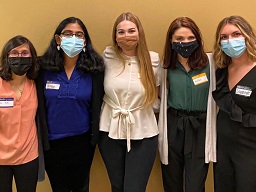 HONORA CARGILE
HONORA CARGILE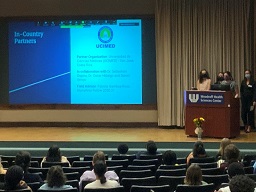 MELISSA COBB
MELISSA COBB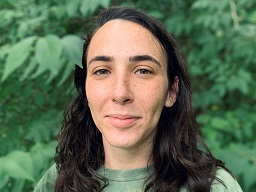 ABBIE COHEN
ABBIE COHEN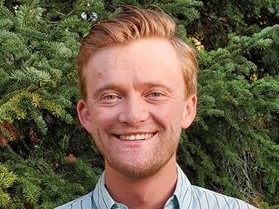 ANDY DAVID
ANDY DAVID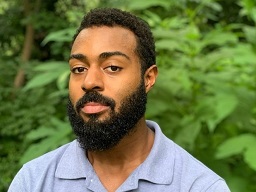 JUSTIN DE SOUZA
JUSTIN DE SOUZA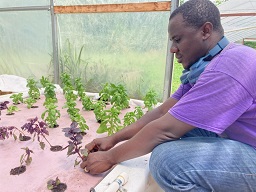 SAM GRIMES
SAM GRIMES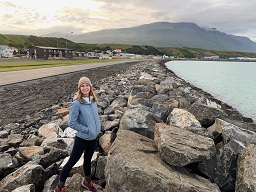 LAURA KEMP
LAURA KEMP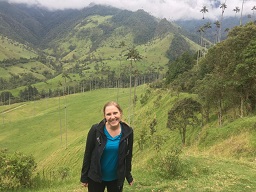 JILL PRITTS
JILL PRITTS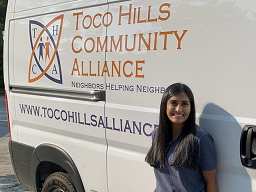 SHAFILA RAHMAN
SHAFILA RAHMAN SAMRIDHI RAJBHANDARI
SAMRIDHI RAJBHANDARI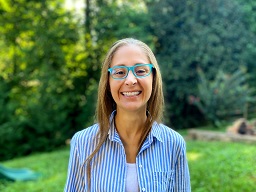 NATALIA REZK
NATALIA REZK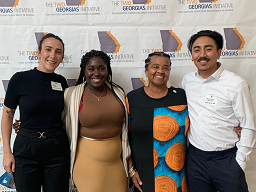 JONATHAN SANTOS
JONATHAN SANTOS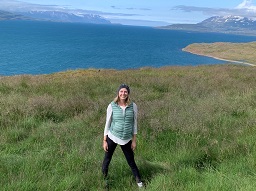
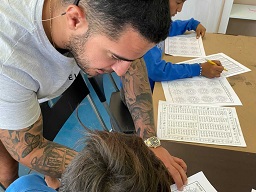 ROSTAM ZAFARI
ROSTAM ZAFARI